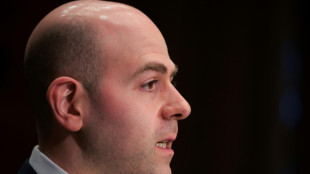
-
 Zuckerberg denies Meta bought rivals to conquer them
Zuckerberg denies Meta bought rivals to conquer them
-
Starc stars as Delhi beat Rajasthan in Super Over

-
 Weinstein asks to sleep in hospital, citing prison 'mistreatment'
Weinstein asks to sleep in hospital, citing prison 'mistreatment'
-
Amorim asks McIlroy to bring Masters magic to Man Utd

-
 Ruud keeps Barcelona Open defence on course
Ruud keeps Barcelona Open defence on course
-
Trump tariffs could put US Fed in a bind, Powell warns

-
 CONCACAF chief rejects 64-team World Cup plan for 2030
CONCACAF chief rejects 64-team World Cup plan for 2030
-
Putin praises Musk, compares him to Soviet space hero

-
 Son to miss Spurs' Europa League trip to Frankfurt
Son to miss Spurs' Europa League trip to Frankfurt
-
US senator in El Salvador seeking release of wrongly deported migrant

-
 Trump tariffs could put the US Fed in a bind, Powell warns
Trump tariffs could put the US Fed in a bind, Powell warns
-
US judge says 'probable cause' to hold Trump admin in contempt

-
 India opposition slams graft charges against Gandhis
India opposition slams graft charges against Gandhis
-
Nate Bargatze to host Emmys: organizers

-
 US Fed Chair warns of 'tension' between employment, inflation goals
US Fed Chair warns of 'tension' between employment, inflation goals
-
Trump touts trade talks, China calls out tariff 'blackmail'

-
 US judge says 'probable cause' to hold govt in contempt over deportations
US judge says 'probable cause' to hold govt in contempt over deportations
-
US eliminates unit countering foreign disinformation

-
 Germany sees 'worrying' record dry spell in early 2025
Germany sees 'worrying' record dry spell in early 2025
-
Israel says 30 percent of Gaza turned into buffer zone

-
 TikTok tests letting users add informative 'Footnotes'
TikTok tests letting users add informative 'Footnotes'
-
Global uncertainty will 'certainly' hit growth: World Bank president

-
 EU lists seven 'safe' countries of origin, tightening asylum rules
EU lists seven 'safe' countries of origin, tightening asylum rules
-
Chelsea fans must 'trust' the process despite blip, says Maresca

-
 Rebel rival government in Sudan 'not the answer': UK
Rebel rival government in Sudan 'not the answer': UK
-
Prague zoo breeds near-extinct Brazilian mergansers

-
 Macron to meet Rubio, Witkoff amid transatlantic tensions
Macron to meet Rubio, Witkoff amid transatlantic tensions
-
WTO chief says 'very concerned' as tariffs cut into global trade

-
 Sports bodies have 'no excuses' on trans rules after court ruling: campaigners
Sports bodies have 'no excuses' on trans rules after court ruling: campaigners
-
Zverev joins Shelton in Munich ATP quarters

-
 The Trump adviser who wants to rewrite the global financial system
The Trump adviser who wants to rewrite the global financial system
-
US senator travels to El Salvador over wrongly deported migrant

-
 UN watchdog chief says Iran 'not far' from nuclear bomb
UN watchdog chief says Iran 'not far' from nuclear bomb
-
Trump says 'joke' Harvard should be stripped of funds

-
 Macron vows punishment for French prison attackers
Macron vows punishment for French prison attackers
-
Canada central bank holds interest rate steady amid tariffs chaos

-
 Rubio headed to Paris for Ukraine war talks
Rubio headed to Paris for Ukraine war talks
-
Australian PM vows not to bow to Trump on national interest

-
 New attacks target France prison guard cars, home
New attacks target France prison guard cars, home
-
Global trade uncertainty could have 'severe negative consequences': WTO chief

-
 Google facing £5 bn UK lawsuit over ad searches: firms
Google facing £5 bn UK lawsuit over ad searches: firms
-
Onana to return in goal for Man Utd against Lyon: Amorim

-
 Tiktok bans user behind Gisele Pelicot 'starter kit' meme
Tiktok bans user behind Gisele Pelicot 'starter kit' meme
-
'Put it on': Dutch drive for bike helmets

-
 China's Xi meets Malaysian leaders, vows to 'safeguard' Asia allies
China's Xi meets Malaysian leaders, vows to 'safeguard' Asia allies
-
France urges release of jailed Russian journalists who covered Navalny

-
 Gabon striker Boupendza dies after 11th floor fall
Gabon striker Boupendza dies after 11th floor fall
-
UK top court rules definition of 'woman' based on sex at birth

-
 PSG keep Champions League bid alive, despite old ghosts reappearing
PSG keep Champions League bid alive, despite old ghosts reappearing
-
Stocks retreat as US hits Nvidia chip export to China


'I don't have a voice in my head': Life with no inner monologue
Mel May only realised she was different while reading a news article one day.
"Wait, what? Some people hear a voice in their head?" she thought at the time.
She was stunned to discover that this was not just a figure of speech -- her friends were actually chatting to themselves in their minds.
May, a 30-year-old Australian video producer who lives in New York, remembers trying to explain to her family: "I don't have a voice in my head."
"My dad was like, 'You are lying'," she told AFP.
But her father came around once May started working with psychologists who agreed -- she is one of the very rare people who lack inner speech.
The idea that some people might not experience this phenomenon is so new that a clinical name, anendophasia, was only proposed for it in a paper last year.
The inner monologue has proven extremely difficult to study because it relies on people being able to describe how they think -- and it turns out we are unreliable narrators.
"People are ignorant about the characteristics of their own inner experience," Russell Hurlburt, a psychology professor at the University of Nevada, Las Vegas, told AFP.
"And it doesn't matter how confident you are," added Hurlburt, a pioneer in the field who has studied people with a range of inner experiences, including May.
Most people assume their inner voice is speaking all the time but it is actually just one of several phenomena of our inner experience, Hurlburt said.
Others include visual imagery, "unsymbolised thinking", feelings and sensory awareness.
- Only a quarter of the time? -
To study these phenomena, Hurlburt conducted research that would have a beeper go off at random while study participants were reading Franz Kafka's "The Metamorphosis" and describe what was in their head.
Rather than speaking the words in their inner voice, they were actually creating visual images -- "their own video" -- of the book, he said.
People also have different kinds of inner speech. Some have multiple voices, while bilingual people can switch languages.
Giordon Stark, a California-based particle physicist who was born deaf, has a mix of inner speech and visual images.
"I don't think of the word 'bed' in my head but I rather visualise the idea of my head hitting the pillow," which is similar to the sign language gesture for the word, the 34-year-old told AFP.
Pressed to estimate how often people are hearing an inner voice, Hurlburt emphasised that much more research is needed on the subject.
But a ballpark figure could be that people are "inner speaking" 20 to 25 percent of the time, he said.
That average includes people who have far more frequent speech and those with none, such as May.
"Her inner experience is close to being nothing but she's the exception rather than the rule," Hurlburt said.
Helene Loevenbruck, a leading inner voice researcher at France's Universite Grenoble Alpes, has had to change her mind on whether people like May could even exist.
"I thought everyone had an inner voice until very recently," she told AFP.
The idea ran counter to her previous work, which suggested inner speech was an important part of speaking out loud, serving as an "internal simulation".
But the work of Hurlburt -- and the discovery that some people cannot create mental images, a condition called aphantasia -- changed her mind.
- 'Pros and cons' -
May believes her lack of an inner voice is why she has never been an anxious person -- and why meditation is very easy for her.
Daniel Gregory, a philosopher specialising in inner speech at the University of Barcelona, said a potential disadvantage of having more inner speech is "a vulnerability to negative thought patterns, to rumination".
But we can also "use inner speech to encourage ourselves, to give ourselves positive messages", he told AFP.
May said a common response to hearing that she has no inner monologue is: "Wow, that must be amazing."
"I'm really quick to push back on that because I think certainly there are pros and cons," she said.
"I reflect a lot about what aspects of the lived experience I'm missing out on."
As well as not stressing about the future, May has a hard time remembering the past.
Loevenbruck said the people she had studied with aphantasia reported having "weird" autobiographical memories "because they have no sensory way of reliving a memory".
May emphasised that lacking an inner voice did not mean she was incapable of thought.
"I'm not dead inside. I know stuff and I feel stuff," said May, who plans to make a documentary about her experience.
Asked what was running through her head, she responded simply.
"Well, I'm sitting here, I'm listening to you and then I just automatically respond. And that's it.
"Isn't that how this happens for everyone?"
K.Hofmann--VB




